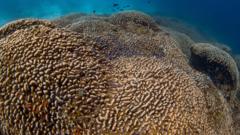In a small island community, traditional hunting practices take on new significance as locals seek refuge from environmental changes caused by climate change.
Tradition at Sea: Dolphin Hunting as a Survival Strategy in the Solomon Islands

Tradition at Sea: Dolphin Hunting as a Survival Strategy in the Solomon Islands
As rising sea levels threaten their homeland, residents of Fanalei Island resort to dolphin hunting to fund their relocation efforts.
The call of a conch shell breaks the dawn's calm on Fanalei Island in the Solomon Islands, where a group of six dolphin hunters gather at the village church to prepare for their day. Brought together by their shared heritage and the encroaching sea, these men engage in whispered prayers before embarking on a challenging journey that could offer a lifeline to their shrinking home.
With saltwater flooding parts of their island, the community faces a dire threat as rising sea levels continue to erode their land. However, the hunters have turned to the ocean for a solution. Through lucrative dolphin hunts, the residents aim to secure funds to purchase land elsewhere, mitigating the impact of their declining environment.
The group paddles out in traditional wooden canoes, scanning the horizon for signs of dolphins. Their efforts are marked by camaraderie and the ancient rituals that define their identity. Upon spotting a dolphin fin piercing the water's surface, hunter Lesley Fugui signals to the others and immediately contacts his wife to share the promising news. This moment sets the stage for an arduous yet vital hunt—one that not only sustains their tradition but serves as a critical means of survival in an increasingly hostile climate.
The harmony between culture and necessity in the Solomon Islands illustrates the complex relationship between environmental change and the preservation of traditions. As these men set out on the quest for dolphins, they carry with them not just the hopes of their community, but also the lives of future generations that may no longer have the same connection to their ancestral home.
With saltwater flooding parts of their island, the community faces a dire threat as rising sea levels continue to erode their land. However, the hunters have turned to the ocean for a solution. Through lucrative dolphin hunts, the residents aim to secure funds to purchase land elsewhere, mitigating the impact of their declining environment.
The group paddles out in traditional wooden canoes, scanning the horizon for signs of dolphins. Their efforts are marked by camaraderie and the ancient rituals that define their identity. Upon spotting a dolphin fin piercing the water's surface, hunter Lesley Fugui signals to the others and immediately contacts his wife to share the promising news. This moment sets the stage for an arduous yet vital hunt—one that not only sustains their tradition but serves as a critical means of survival in an increasingly hostile climate.
The harmony between culture and necessity in the Solomon Islands illustrates the complex relationship between environmental change and the preservation of traditions. As these men set out on the quest for dolphins, they carry with them not just the hopes of their community, but also the lives of future generations that may no longer have the same connection to their ancestral home.







